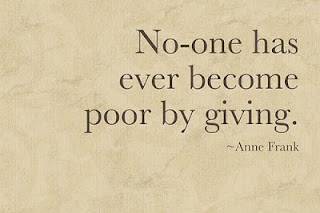Un-teaching Our Children
The other day as I passed by two mothers, each with a child, I overheard a typical lesson, "Olivia, you need to share, share your toy with Nate, he needs a turn too." I couldn't help but laugh at the irony of that lesson as the mothers smiled to themselves, priding themselves on teaching a basic principle: sharing.
It's pounded in our heads from the time we can claim an object that we're supposed to share. That's what nice people do, they share. Good people know that nothing is really theirs and that to be good people they must share. Well, I am convinced there is no lesson as quickly reversed for a child in America than sharing.
Sure, Olivia needs to share her toy with Nate, but anything else? How quickly are we taught to not share anything, clothes, money, time, food, etc. Once when I was in Salt Lake I watched a little boy try to give his half eaten candy bar to a homeless man on the sidewalk, his mom grabbed him away so fast. The little boy looked startled and the homeless man, unsurprised. What lesson did that little boy learn: don't share. Every time we tell a child that we don't have time it translates as "don't share." Every time someone asks us to donate to this or that outside a grocery store and we don't, our kids learn that you don't really have to share, in fact you probably shouldn't. We learn quickly that you only give or share what you can get back.
Eventually, "sharing" becomes entirely about telling stories and showing people what you've accumulated. By the age of five, if not earlier, a child knows that sharing simply isn't done.
We are so consumed with greed and selfishness that the idea of giving someone else anything beyond a smile (if even that) is so foreign to us that we can't fathom it. We tell ourselves that giving to other people is pointless and a waste of money, he'll probably just use it to buy drugs or alcohol anyway. We tell ourselves that we need every penny we have, or we won't make it.
All financial planners and experts say the same thing: Make room in your budget for helping others out. We are designed to help others, we feel good about contributing to the welfare and improvement of other people's lives, yet we avoid it, we cling to our every last dollar telling ourselves that it'll save us. But, in the end, you'll be poorer for it, literally and figuratively.
It's pounded in our heads from the time we can claim an object that we're supposed to share. That's what nice people do, they share. Good people know that nothing is really theirs and that to be good people they must share. Well, I am convinced there is no lesson as quickly reversed for a child in America than sharing.
Sure, Olivia needs to share her toy with Nate, but anything else? How quickly are we taught to not share anything, clothes, money, time, food, etc. Once when I was in Salt Lake I watched a little boy try to give his half eaten candy bar to a homeless man on the sidewalk, his mom grabbed him away so fast. The little boy looked startled and the homeless man, unsurprised. What lesson did that little boy learn: don't share. Every time we tell a child that we don't have time it translates as "don't share." Every time someone asks us to donate to this or that outside a grocery store and we don't, our kids learn that you don't really have to share, in fact you probably shouldn't. We learn quickly that you only give or share what you can get back.
Eventually, "sharing" becomes entirely about telling stories and showing people what you've accumulated. By the age of five, if not earlier, a child knows that sharing simply isn't done.
We are so consumed with greed and selfishness that the idea of giving someone else anything beyond a smile (if even that) is so foreign to us that we can't fathom it. We tell ourselves that giving to other people is pointless and a waste of money, he'll probably just use it to buy drugs or alcohol anyway. We tell ourselves that we need every penny we have, or we won't make it.
All financial planners and experts say the same thing: Make room in your budget for helping others out. We are designed to help others, we feel good about contributing to the welfare and improvement of other people's lives, yet we avoid it, we cling to our every last dollar telling ourselves that it'll save us. But, in the end, you'll be poorer for it, literally and figuratively.








Comments
Post a Comment